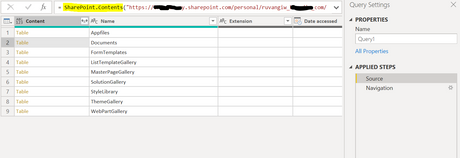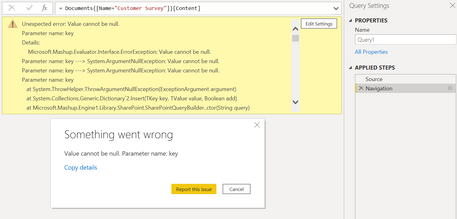FabCon is coming to Atlanta
Join us at FabCon Atlanta from March 16 - 20, 2026, for the ultimate Fabric, Power BI, AI and SQL community-led event. Save $200 with code FABCOMM.
Register now!- Power BI forums
- Get Help with Power BI
- Desktop
- Service
- Report Server
- Power Query
- Mobile Apps
- Developer
- DAX Commands and Tips
- Custom Visuals Development Discussion
- Health and Life Sciences
- Power BI Spanish forums
- Translated Spanish Desktop
- Training and Consulting
- Instructor Led Training
- Dashboard in a Day for Women, by Women
- Galleries
- Data Stories Gallery
- Themes Gallery
- Contests Gallery
- QuickViz Gallery
- Quick Measures Gallery
- Visual Calculations Gallery
- Notebook Gallery
- Translytical Task Flow Gallery
- TMDL Gallery
- R Script Showcase
- Webinars and Video Gallery
- Ideas
- Custom Visuals Ideas (read-only)
- Issues
- Issues
- Events
- Upcoming Events
The Power BI Data Visualization World Championships is back! Get ahead of the game and start preparing now! Learn more
- Power BI forums
- Forums
- Get Help with Power BI
- Power Query
- Power query Sharepoint/ Onedrive Folder connector ...
- Subscribe to RSS Feed
- Mark Topic as New
- Mark Topic as Read
- Float this Topic for Current User
- Bookmark
- Subscribe
- Printer Friendly Page
- Mark as New
- Bookmark
- Subscribe
- Mute
- Subscribe to RSS Feed
- Permalink
- Report Inappropriate Content
Power query Sharepoint/ Onedrive Folder connector issue (not showing files shared With me / error)
Hi All,
I am using Power Query to connect to files within multiple OneDrive for business folders (Connecting to each per query) and to combine them to 1 single file.
I am Navigating using the 'Sharepoint.Contents' function to locate the files within the 'Documents' table folder that has the folders/files shared with me. (I have connected the folder using organizational level permissions)
This is working for most OneDrive for business users but getting a couple of issues with some users only.
Note: that all folders shared with me are accessible on OneDrive through web, and I have editor permission on each.
The above works for all Onedrive folders except for a select few users,
1) Not showing all /Any folders shared with me.
In the Following, it is showing me only 1 folder that has been shared but many other folders shared with me are not visible to navigate. This would be the main issue I have where I get issue with users that have shared multiple folders with me OneDrive. For another user this table is empty, but they have shared multiple folders with me.
(I don't seem to have this issue on SharePoint sites. )
2) Not showing all /Any folders shared with me.
When I try navigate further into the folder that has been shared with me, it seems that powerQuery runs into a bug/issue where It cannot locate files within this folder, Hence I am getting the following error
Unexpected error: Value cannot be null.
Parameter name: key
Details:
Microsoft.Mashup.Evaluator.Interface.ErrorException: Value cannot be null.
Parameter name: key ---> System.ArgumentNullException: Value cannot be null.
Parameter name: key ---> System.ArgumentNullException: Value cannot be null.
Parameter name: key
at System.ThrowHelper.ThrowArgumentNullException(ExceptionArgument argument)
at System.Collections.Generic.Dictionary`2.Insert(TKey key, TValue value, Boolean add)
at Microsoft.Mashup.Engine1.Library.SharePoint.SharePointQueryBuilder..ctor(String query)
at Microsoft.Mashup.Engine1.Library.SharePoint.SharePointQueryBuilder.GetPath(String query)
at Microsoft.Mashup.Engine1.Library.SharePoint.SharePointUrlBuilder..ctor(String url, SharePointApiVersion version)
at Microsoft.Mashup.Engine1.Library.SharePoint.SharePointTableValue.CreateFromFeedRecord(SharePointUrlBuilder urlBuilder, SharePointEnvironment environment, RecordValue feedRecord)
at Microsoft.Mashup.Engine1.Library.SharePoint.SharePointTableValue.SharePointFeedEnumerator.CreateFolderRecord(RecordValue feedRecord)
at Microsoft.Mashup.Engine1.Library.SharePoint.SharePointTableValue.SharePointFeedEnumerator.MoveNext()
at Microsoft.Mashup.Engine1.Library.SharePoint.SharePointTableValue.SharePointTableEnumerator.MoveNext()
at Microsoft.Mashup.Evaluator.SimpleDocumentEvaluator.ValuePreviewValueSource.TableValuePreviewValueSource.SerializeRows(Int32 count)
at Microsoft.Mashup.Evaluator.SimpleDocumentEvaluator.ValuePreviewValueSource.TableValuePreviewValueSource.get_SmallValue()
at Microsoft.Mashup.Evaluator.Interface.TracingPreviewValueSource.get_SmallValue()
at Microsoft.Mashup.Evaluator.RemotePreviewValueSource.<>c__DisplayClass0_0.<RunStub>b__0()
at Microsoft.Mashup.Evaluator.EvaluationHost.ReportExceptions(IHostTrace trace, IEngineHost engineHost, IMessageChannel channel, Action action)
--- End of inner exception stack trace ---
at Microsoft.Mashup.Evaluator.EvaluationHost.<>c__DisplayClass11_0.<TryReportException>b__1()
at Microsoft.Mashup.Common.SafeExceptions.IgnoreSafeExceptions(IEngineHost host, IHostTrace trace, Action action)
at Microsoft.Mashup.Evaluator.EvaluationHost.TryReportException(IHostTrace trace, IEngineHost engineHost, IMessageChannel channel, Exception exception)
at Microsoft.Mashup.Evaluator.EvaluationHost.ReportExceptions(IHostTrace trace, IEngineHost engineHost, IMessageChannel channel, Action action)
at Microsoft.Mashup.Evaluator.RemotePreviewValueSource.RunStub(IEngineHost engineHost, IMessageChannel channel, Func`1 getPreviewValueSource)
at Microsoft.Mashup.Evaluator.RemoteDocumentEvaluator.Service.<>c__DisplayClass12_1`1.<OnBeginGetResult>b__0()
at Microsoft.Mashup.Evaluator.EvaluationHost.ReportExceptions(IHostTrace trace, IEngineHost engineHost, IMessageChannel channel, Action action)
at Microsoft.Mashup.Evaluator.RemoteDocumentEvaluator.Service.OnBeginGetResult[T](IMessageChannel channel, BeginGetResultMessage message, Action`1 action)
at Microsoft.Mashup.Evaluator.RemoteDocumentEvaluator.Service.OnBeginGetPreviewValueSource(IMessageChannel channel, BeginGetPreviewValueSourceMessage message)
at Microsoft.Mashup.Evaluator.MessageHandlers.TryDispatch(IMessageChannel channel, Message message)
at Microsoft.Mashup.Evaluator.ChannelMessenger.ChannelMessageHandlers.TryDispatch(IMessageChannel channel, Message message)
at Microsoft.Mashup.Evaluator.MessageHandlers.Dispatch(IMessageChannel channel, Message message)
at Microsoft.Mashup.Evaluator.ChannelMessenger.OnMessageWithUnknownChannel(IMessageChannel baseChannel, MessageWithUnknownChannel messageWithUnknownChannel)
at Microsoft.Mashup.Evaluator.MessageHandlers.TryDispatch(IMessageChannel channel, Message message)
at Microsoft.Mashup.Evaluator.ChannelMessenger.ChannelMessageHandlers.TryDispatch(IMessageChannel channel, Message message)
at Microsoft.Mashup.Evaluator.MessageHandlers.Dispatch(IMessageChannel channel, Message message)
at Microsoft.Mashup.Evaluator.EvaluationHost.Run()
at Microsoft.Mashup.Container.EvaluationContainerMain.Run(Object args)
at Microsoft.Mashup.Evaluator.SafeThread2.<>c__DisplayClass9_0.<CreateAction>b__0(Object o)
at Microsoft.Mashup.Container.EvaluationContainerMain.SafeRun(String[] args)
at Microsoft.Mashup.Container.EvaluationContainerMain.Main(String[] args)
--- End of inner exception stack trace ---
at Microsoft.Mashup.Evaluator.EvaluationHost.OnException(IEngineHost engineHost, IMessageChannel channel, ExceptionMessage message)
at Microsoft.Mashup.Evaluator.MessageHandlers.TryDispatch(IMessageChannel channel, Message message)
at Microsoft.Mashup.Evaluator.MessageHandlers.Dispatch(IMessageChannel channel, Message message)
at Microsoft.Mashup.Evaluator.ChannelMessenger.ChannelMessageHandlers.TryDispatch(IMessageChannel channel, Message message)
at Microsoft.Mashup.Evaluator.MessageHandlers.Dispatch(IMessageChannel channel, Message message)
at Microsoft.Mashup.Evaluator.Interface.IMessageChannelExtensions.WaitFor[T](IMessageChannel channel)
at Microsoft.Mashup.Evaluator.RemotePreviewValueSource.PreviewValueSource.WaitFor(Func`1 condition, Boolean disposing)
at Microsoft.Mashup.Evaluator.RemotePreviewValueSource.PreviewValueSource.get_SmallValue()
at Microsoft.Mashup.Evaluator.Interface.TracingPreviewValueSource.get_SmallValue()
at Microsoft.Mashup.Host.Document.Analysis.PackageDocumentAnalysisInfo.PackagePartitionAnalysisInfo.SetPreviewValue(EvaluationResult2`1 result, Func`1 getStaleSince, Func`1 getSampled)
- Mark as New
- Bookmark
- Subscribe
- Mute
- Subscribe to RSS Feed
- Permalink
- Report Inappropriate Content
Hi @Anonymous
Please use the lastest version of power bi desktop(2020/5).
Do you connect with the "sharepoint folder" connector?
If you connect to many sharepoint folders which are different sharepoint account, please ensure you provide the correct credential for every source(Edit queries->Data source setting->edit permission).
Best Regards
Maggie
- Mark as New
- Bookmark
- Subscribe
- Mute
- Subscribe to RSS Feed
- Permalink
- Report Inappropriate Content
Hi @v-juanli-msft , Thanks Maggie,
Your solution looks like the will work with the error I'm getting for issue 2) I am facing, however May 2020 update seem to be not available to my region yet.
I am using the sharepoint folder connector to get the query started but I change it to SharePoint.Contents on the query to navigate to my files required. (within the OneDrive for business space).
Credentials are correct and the query does connect to the OneDrive account, however my main issue was the files not appearing when go to 'documents' table. it would only show 1 of the folders shared with me at a time.
Helpful resources

Power BI Dataviz World Championships
The Power BI Data Visualization World Championships is back! Get ahead of the game and start preparing now!

| User | Count |
|---|---|
| 17 | |
| 9 | |
| 8 | |
| 7 | |
| 7 |




